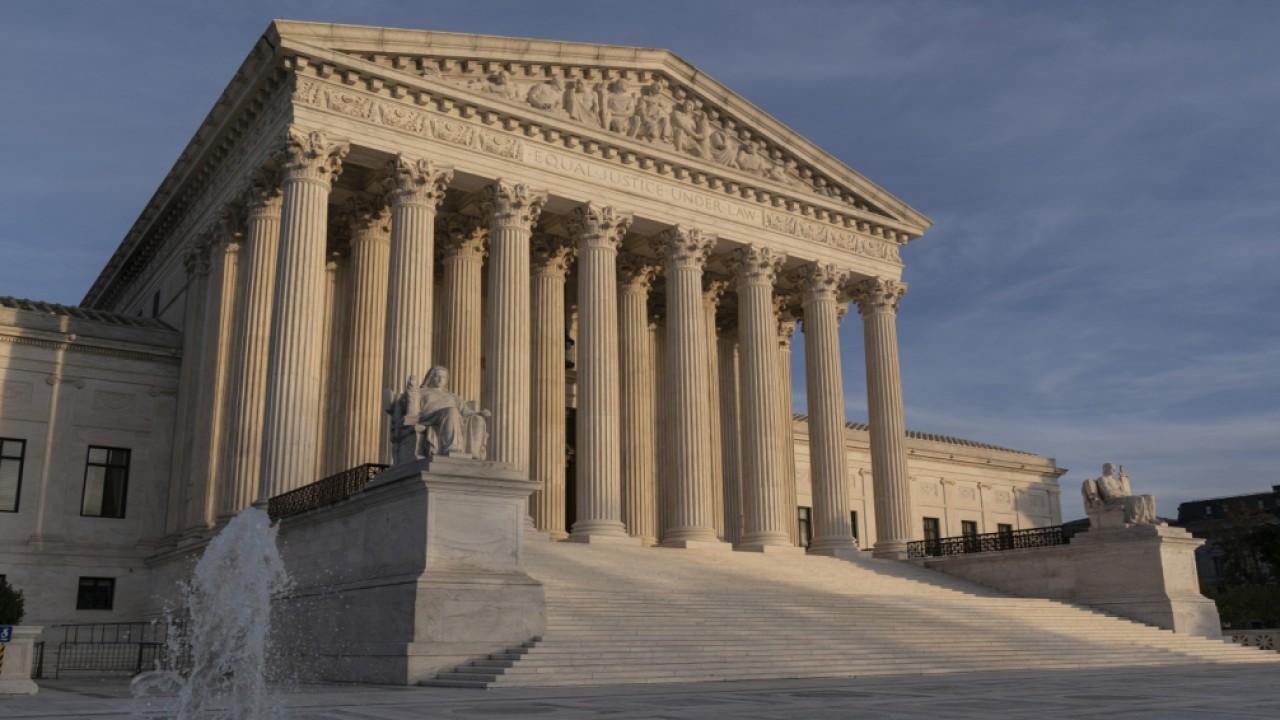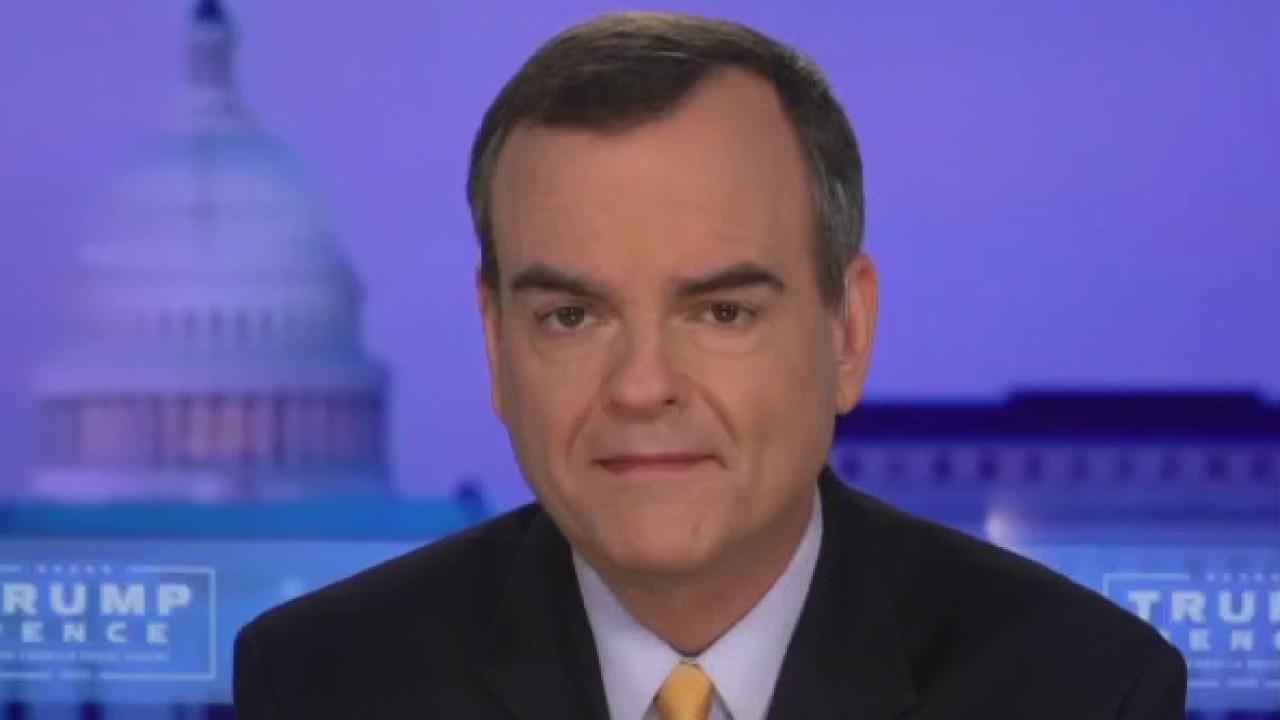ObamaCare architect warns SCOTUS ruling against ACA would be 'trouble'
If Republicans retain control of the Senate, ‘it’s going to be hard’ to replace the ACA, Jonathan Gruber says
As long as Republicans retain control at least one house of Congress, “it’s going to be hard to put in place a replacement” for the Affordable Care Act, ObamaCare and RomeyCare architect Jonathan Gruber argued on Tuesday.
The MIT Ford economics professor made the comment on “Mornings with Maria” reacting to the Affordable Care Act (ACA) case before the Supreme Court that has the potential to overturn the law that is former President Obama's signature legislative achievement. Gruber warned on Tuesday that if that happens, “we’re in big trouble.”
For the third time since its inception a decade ago, the ACA headed to the Supreme Court and is facing the most conservative panel of justices who have sat on the bench in years.
The highest court in the nation heard oral arguments last week in a White House-backed legal challenge to the landmark health care law, often referred to as ObamaCare.
Democrats made the ACA, and the lawsuit seeking to rule it unconstitutional, the centerpiece of their effort to block the confirmation of Justice Amy Coney Barrett last month. Her eventual confirmation to the court tilted its ideological balance 6-3 in favor of conservatives.
The latest case — California v. Texas, which is based on an earlier lawsuit brought by 21 Republican state attorneys general and endorsed by the Trump administration — argues the ACA was invalidated when Republicans in 2017 eliminated the financial penalty for Americans who don’t buy health insurance with the passage of the Tax Cuts and Jobs Act.
The court initially upheld the law because of the individual mandate, which required Americans to purchase health insurance or pay a fine, under Congress’ vast taxing authority. The suit contends that if that part of the ACA is invalid, so is the rest of the law.
Host Maria Bartiromo noted that the Supreme Court “is expected to announce its decision on constitutionality in late spring.” She also pointed out President-elect Joe Biden “has made health care a key issue in his campaign.”
Speaking on Nov. 10, the same day the Supreme Court heard virtual arguments, Biden said, “Here in America health care is a right for all, not a privilege for a few so come January, we are going to work quickly with the Congress to dramatically ramp up health care protections, get Americans universal coverage, lower health care costs as soon as humanly possible.”
“We want every single American to know, if you’re sick, if you’re struggling, if you’re worried about how you’re going to get through the day, we will not abandon you. That is a promise,” the former vice president continued.
Bartiromo asked Gruber on Tuesday where he thinks the case before the Supreme Court is headed.
“We have to start with the fact that literally, every expert, including the lawyers who brought previous cases against the ACA think this is a stupid case,” he responded.
MEDICARE MAY NOT COVER CORONAVIRUS VACCINE COSTS: REPORT
“It really has no merit and fortunately it looked like the oral arguments supported the fact that at least five justices, or at least the key justices, [Chief] Justice [John] Roberts and Justice [Brett] Kavanaugh agreed that there’s simply no reason … to take down the whole law based on the constitutionality of the mandate.”
“So hopefully based on those arguments the court case will go away and the ACA will stand,” he continued, adding that he’s “feeling pretty good about that.”
He then warned that if it doesn’t, “The ACA is in big trouble because as long as Republicans retain control of Congress or at least one house of Congress, it’s going to be hard to put in place a replacement for the ACA.”
Bartiromo asked Gruber what would happen to the millions of people who currently have private health insurance through the companies who employ them and don’t what that to go away.
He responded by saying that the ACA “doesn’t play a huge role.”
“It does play a small role because it guarantees that their employers have to offer them real insurance coverage. They can’t offer them coverage that, for example, has an annual limit so they go to a hospital, stay and end up with huge bill,” Gruber explained.
“But by and large, for the 180 million Americans with employer-sponsored health insurance, the Affordable Care Act didn’t much affect their lives, whether it goes away or not will not have a huge impact on their lives.”
“I think for those people, the real issue is how do we control health care costs,” he continued, noting that “neither party has a brilliant answer on it.”
“It’s the hardest issue in some sense, ironically given the 12 years of battle over the Affordable Care Act,” Gruber said. “Ironically that was the easy part because that was mostly about coverage, coverage is about spending money.”
“Cost control is about saving money,” he continued. “That as you know in Washington is the harder part and that means taking on some individuals who are making money on the health care system who maybe will have to see their incomes fall if we control health care costs.”
“It means revamping a system where a lot of parties have a vested interest in not letting it change and that’s the fundamental political challenge that we face when we try to control health care costs,” he went on to explain.
Gruber also discussed what he believes will happen to health care if Democrats gain control of the Senate.
GOP Sens. David Perdue and Kelly Loeffler will face off against their Democratic challengers in Georgia's two Senate runoff elections in January.
Georgia state law mandates a runoff if no candidate reaches 50% of the vote on Election Day. Perdue narrowly missed out on avoiding a runoff against Democratic challenger Jon Ossoff, who Perdue leads by roughly 90,000 votes.
Meanwhile, Loeffler -- who captured nearly 26% of the vote in a whopping 20-candidate race -- will face off against Democrat Raphael Warnock, who won nearly 33% of the vote.
Last week, Alaska Republican Sen. Dan Sullivan was projected to have won reelection over Democratic challenger Al Gross, giving Republicans 50 seats in the U.S. Senate compared to Democrats' 48. That means the Democrats must win both of Georgia’s runoff elections to make it a 50-50 Senate. In that scenario, Vice President-elect Kamala Harris would be able to break any ties in the chamber.
Gruber said if Democrats gain control of the Senate, Biden, will try to “expand generosity of the subsidies on the exchanges.”
“While I’m a big believer in the ACA exchanges, they simply aren’t generous enough for people who are low income,” Gruber said, noting that someone can end up spending more than 20% of their income on health care on the exchanges, which Biden would end.
“He [Biden] would both make them more generous and he’d make them available with subsidies to everyone, not just those below 4 times the poverty line,” Gruber explained.
He then pointed out that “that is not very politically controversial,” but rather a budget issue.
“Republicans, I think don’t want to spend the money, Democrats would be willing to,” he said, adding that “it’ll happen if Democrats control the Congress” and it “won’t if they don’t.”
Gruber then pointed out what he thought was the more controversial piece, “the so-called public option.”
He explained the “two aspects of the public option,” which he referred to as “public option lite and the public action-heavy.”
“The public option lite is having a government-sponsored insurance plan that’s just like any other insurance plan, it’s just another option on the exchanges… without government-regulated rates to providers,” Gruber said, noting the difference between the lite and heavy options.
“Public option heavy is having something like Medicare, which regulates the rate providers are paid,” he continued.
He then explained “the big advantage” of public option “lite,” saying “it offers some more competition on the exchanges, which is good.”
“But most importantly it offers a route to bring coverage to the millions of Americans who have been denied insurance in states like Georgia and Texas and Florida where the federal government has offered to pay 90% of the costs of covering their lowest-income citizens with insurance, but their state legislatures and governors have turned it down selfishly,” he continued.
He added that the other public option, “would involve regulating rates and that would be opposed.”
GET FOX BUSINESS ON THE GO BY CLICKING HERE
Gruber noted that he believes insurers will oppose the “heavy” option because they would “feel like it might eat into their business.” He added that it would also be opposed by providers “who might be worried about getting lower rates.”
“So that’s going to be a heavier political lift,” Gruber said.
“I’m not sure just having 50 in the Senate is enough. I’m not sure that you can get every single Democratic senator to support that. I think that’s going to be more of a battle.”
CLICK HERE TO READ MORE ON FOX BUSINESS
FOX Business’ Megan Henney contributed to this report.






















